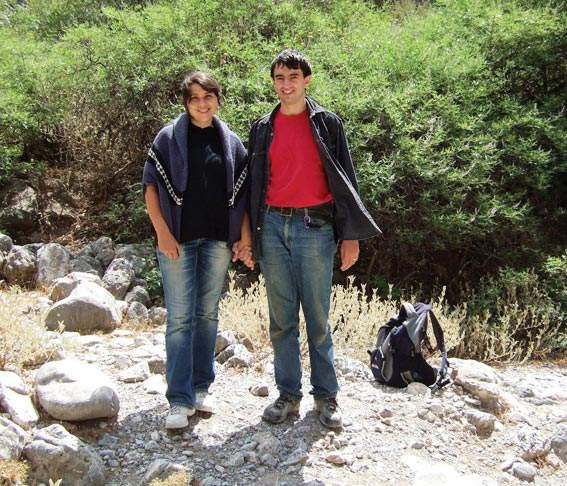
Even as a child,
Dr. Dmitry Gourevitch knew he was going to study the exact sciences. But when he embarked on university studies at age 15, after immigrating to Israel from Russia, he wasn’t sure he was going to opt for an academic career. All doubts disappeared when he encountered representation theory, a highly abstract area of mathematics. “It felt as if I’d climbed a mountain peak and could observe parts of the Earth I’d never seen before,” recalls Gourevitch, who recently joined the Weizmann Institute’s Mathematics Department. “The joy of discovery was tremendous; I suddenly realized how various concepts were interconnected in ways I had no idea existed.”
Gourevitch has been seriously engaged in mathematics for more than half of his 29 years, thanks in large part to the school he attended in St. Petersburg (then known as Leningrad). The legendary school No. 30 was known to be a breeding ground for mathematical geniuses: Its students won a disproportionate number of prizes at local and national mathematics Olympiads, many of them later becoming professional mathematicians.
After “making aliya” with his parents in 1995, Gourevitch entered a “special status” program allowing him to study towards a degree in mathematics at Tel Aviv University in parallel with high school. It was in a university course taught by Prof. Joseph Bernstein that he was struck by the explanatory power of algebra, particularly representation theory. He was ultimately to make this theory the focus of his research – but only after earning his B.Sc. with honors at age 18, completing his compulsory service in the Israel Defense Forces and, at 22, enrolling in graduate studies at the Weizmann Institute. He earned his M.Sc. and Ph.D. degrees from the Institute under the guidance of Bernstein and Weizmann’s Prof. Stephen Gelbart. After conducting postdoctoral research at the Institute for Advanced Study in Princeton and at Rutgers, New Jersey, Gourevitch now works on representation theory in his position of Senior Scientist at Weizmann.
Representation theory, which studies the symmetries of linear spaces, is so powerful because it combines two of the most fundamental concepts in mathematics: the technique of linearization and the notion of symmetry, which appears in multiple problems in mathematics, physics and other exact sciences. The theory has a wide variety of applications – in other areas in mathematics, in quantum mechanics, in engineering and in computer science. Translating basic research into practice, however, takes time. Many decades passed, for instance, before certain concepts of representation theory, developed in the late nineteenth and early twentieth centuries, found their application in computer tomography (CT) – the medical imaging technique. Similarly, it took decades before other concepts helped to speed computation or provide solutions to major problems in computer science, such as the expander problem, whose solution allows one to connect multiple users into a single communications network in an optimal manner.
It’s impossible to predict what applications might one day arise from Gourevitch’s current research. Together with colleagues, he has already managed to prove the so-called multiplicity one conjectures, which had remained unproven for 20 years. He has also made several other contributions to his field and is hoping to make more. The one thing that’s certain is that the mountain peak he is climbing in his studies is particularly high – he is working on representations of the so-called non-compact groups, notorious for their complexity – and that it is bound to help reveal new landscapes that are presently hidden from the scientists’ view.
Mathematical romance
Dmitry and his wife Anna met at a lecture in algebraic topology at Tel Aviv University. Their romance was fostered by a shared interest in algebraic geometry. Shortly after getting married, the couple published a joint paper in the Journal of Pure and Applied Algebra. They now live in Rehovot with their children. Anna is a teaching associate in mathematics at Tel Aviv University, from which she earned her Ph.D.
